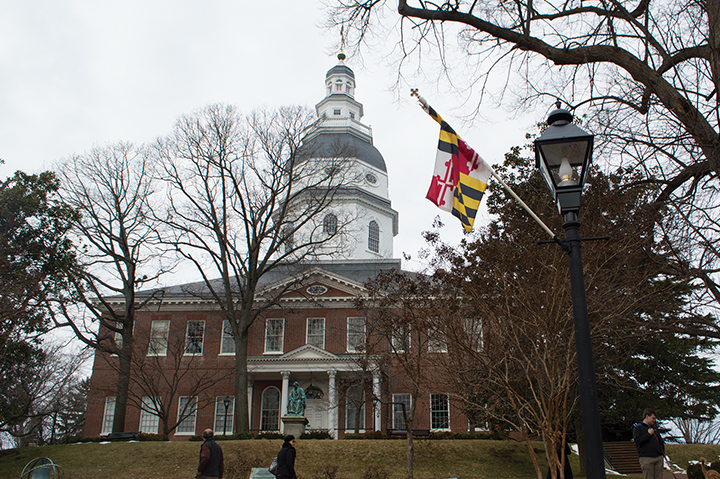After eleven years on the Maryland House Appropriations Committee, Del. Wendell Beitzel (R-Garrett and Allegheny counties) has come to recognize a recurring face among the University of Maryland graduate assistants who sit before the committee year after year, asking for collective bargaining rights.
So, after listening to the latest round of student testimony for the cause at a committee hearing on Tuesday, Beitzel had just one question.
“You’ve been here numerous times,” he told Will Howell, a communication doctoral student. “When’re you gonna graduate?”
Indeed, the committee’s chambers is a familiar setting to Howell — who told Beitzel, with a laugh, that he defended his dissertation in December — and his fellow activists. Howell has been involved in the legislative battle for collective bargaining rights since he arrived on this university’s campus in 2013, over a decade since the House heard its first bill on the matter.
This time around, cushioned by the House’s approval of last year’s bill, Howell and the two students who joined him in testifying kept things short. They mainly used their time to thank the delegates for their previous support and remind them that the current infrastructure to address graduate students’ concerns is insufficient.
Since 2012, graduate assistants in the University System of Maryland have been able to engage with administrators in a process called “meet-and-confer” — discussions of workplace issues that do not result in binding agreements. In her testimony, American studies doctoral student Adelaida Shelley identified flaws in the structure.
[Read more: UMD students’ petition for a sign language major has more than 500 signatures]
“The meet-and-confer body that exists currently, though it has had some small successes, is largely ineffective in getting graduate assistants what they need in order to have a safe and fulfilling and productive workplace,” said Shelley, who serves as co-chair of the Graduate Assistant Advisory Committee, the university’s meet-and-confer graduate student body.
But in their testimony, both graduate school Dean Steve Fetter and system academic and student affairs vice chancellor Joann Boughman disagreed. Meet-and-confer provides graduate student workers with many of the “perceived benefits” that collective bargaining would offer, Fetter said, and has allowed the graduate school to respond to student concerns.
To illustrate his point, Fetter highlighted last year’s decision to require advisers to meet with their graduate assistant at the start of each semester to lay out shared expectations. He also pointed to the graduate school’s grievance policy and the fact that the school has worked to raise graduate assistants’ minimum stipend — since April 2017, this amount has increased by 16 percent.
“My job and the mission of the graduate school is to help all students succeed,” he said.
However, student activists have previously said the graduate school does not require any documentation of meetings between student workers and their advisers. And, they point out, a sizable discrepancy still exists between the minimum stipend afforded to graduate assistants and the area’s cost of living — $18,791 versus the $36,492 MIT’s Living Wage Calculator estimates it would take a single adult to live in Prince George’s County for a year.
During his testimony, Fetter also detailed potential drawbacks, should the minimum stipend increase following unionization efforts. If state funding to the university doesn’t rise proportionally to cover the increased costs, Fetter said departments could be forced to offer fewer assistantships.
Additionally, he pointed out, graduate assistants are currently exempt from paying Social Security and Medicare taxes — a status that could change should they gain benefits such as Social Security and unemployment.
Alex Rittle, president of University of Maryland-Baltimore County’s Graduate Student Association, reiterated Fetter’s concern in his testimony against the bill.
“We fear that these additional costs would adversely hinder future graduate student pools, whether it be from future out of pocket costs from the students themselves or because departments will absorb some of those costs and thus [be able to] support less students,” he said.
[Read more: Developers present ideas for new UMD grad student housing near The Domain]
But geographical sciences doctoral student Rachel Lamb emphasized that the legislation does not mandate unionization. Instead, it would only provide students with a choice and a possible alternative to the meet-and-confer process.
Moving forward, the House bill’s companion is planned to drop in the Senate on Wednesday — with the co-sponsorship of Sen. Delores Kelley, chair of the Senate Finance Committee, as of Tuesday. Her support represented big news for graduate student activists because, last time around, she allowed the legislation to die in committee.
But activists’ work isn’t done yet. Lamb, government affairs vice president of the university’s Graduate Student Government, said they plan to continue pushing more students to submit written testimony and sign onto a petition supporting the bill. As of Tuesday, nearly 30 students had submitted written testimony and about 400 had signed the petition.
“We feel pretty good about getting out of committee, so we will not take that for granted, but make sure that we keep maintaining helpful, positive pressure there,” Lamb said.
CORRECTION: Due to a reporting error, a previous version of this story incorrectly stated Del. Kirill Reznik asked Will Howell when he would graduate. It was Del. Wendell Beitzel who asked. This story has been updated.



